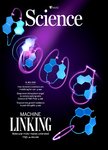作者:Thorp, H. Holden
摘要:All brains work differently. Individuals process information and engage with the world in ways that are influenced by a multitude of biological, cultural, and social factors. In the world of science, these differences are what spark innovation. This is why the scientific community needs to better recognize the enormous potential of neurodiversity and bear in mind that certain behavioral and cognitive traits that may strike some as unusual can be catalytic to the scientific quest.
作者:Giampazolias, Evangelos; Pereira da Costa, Mariana; Lam, Khiem C.; Lim, Kok Haw Jonathan; Cardoso, Ana; Piot, Cecile; Chakravarty, Probir; Blasche, Sonja; Patel, Swara; Biram, Adi; Castro-Dopico, Tomas; Buck, Michael D.; Rodrigues, Richard R.; Poulsen, Gry Juul; Palma-Duran, Susana A.; Rogers, Neil C.; Koufaki, Maria A.; Minutti, Carlos M.; Wang, Pengbo; Vdovin, Alexander; Frederico, Bruno; Childs, Eleanor; Lee, Sonia; Simpson, Ben; Iseppon, Andrea; Omenetti, Sara; Kelly, Gavin; Goldstone, Robert; Nye, Emma; Suarez-Bonnet, Alejandro; Priestnall, Simon L.; Macrae, James I.; Zelenay, Santiago; Patil, Kiran Raosaheb; Litchfield, Kevin; Lee, James C.; Jess, Tine; Goldszmid, Romina S.; Sousa, Caetano
作者单位:Francis Crick Institute; Cancer Research UK; University of Manchester; National Institutes of Health (NIH) - USA; NIH Center for Cancer Research (CCR); NIH National Cancer Institute (NCI); Imperial College London; Francis Crick Institute; University of Cambridge; National Institutes of Health (NIH) - USA; NIH National Cancer Institute (NCI); Frederick National Laboratory for Cancer Research; National Institutes of Health (NIH) - USA; NIH National Cancer Institute (NCI); Aalborg University; Francis Crick Institute; University of Manchester; Cancer Research UK; University of London; University College London; Francis Crick Institute; Francis Crick Institute; University of London; University of London Royal Veterinary College; Francis Crick Institute; University of London; University College London; UCL Medical School; Royal Free London NHS Foundation Trust; Christie NHS Foundation Trust; Fundacao Champalimaud
摘要:A role for vitamin D in immune modulation and in cancer has been suggested. In this work, we report that mice with increased availability of vitamin D display greater immune-dependent resistance to transplantable cancers and augmented responses to checkpoint blockade immunotherapies. Similarly, in humans, vitamin D-induced genes correlate with improved responses to immune checkpoint inhibitor treatment as well as with immunity to cancer and increased overall survival. In mice, resistance is at...
